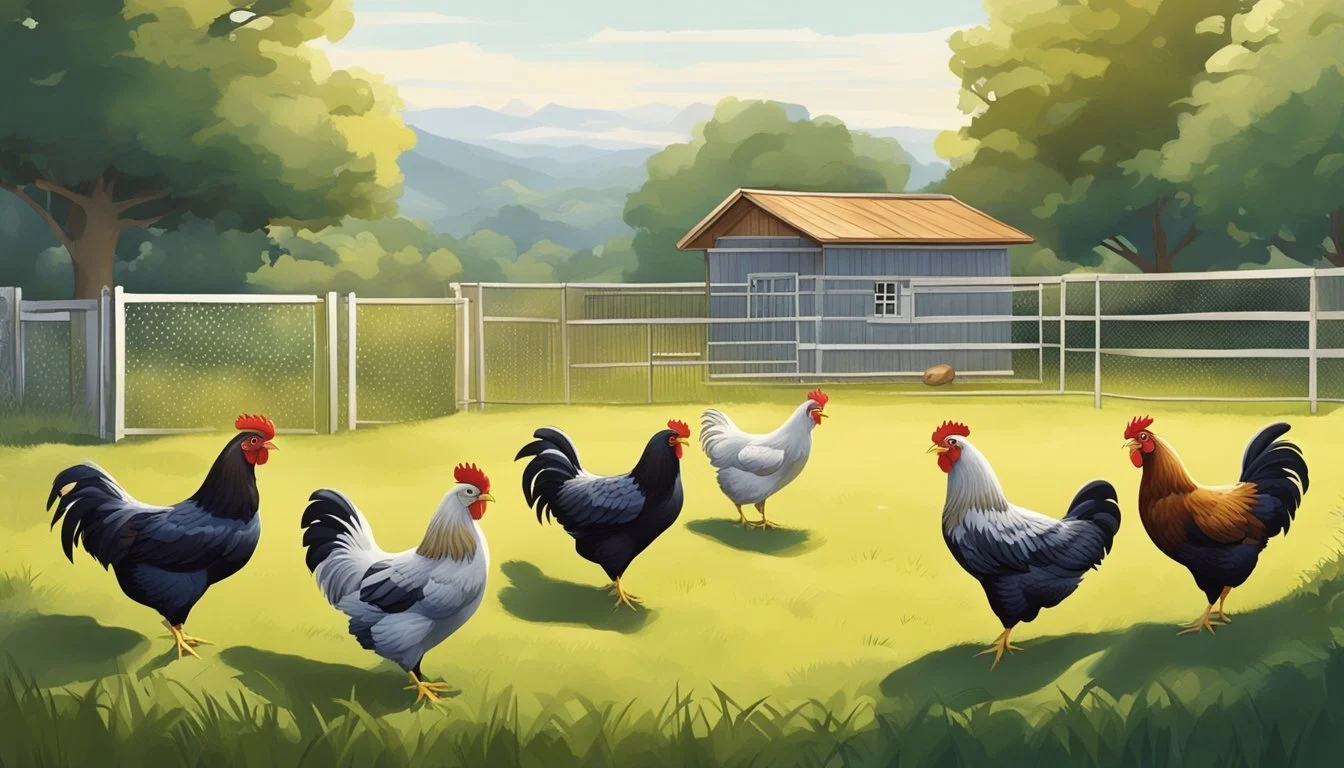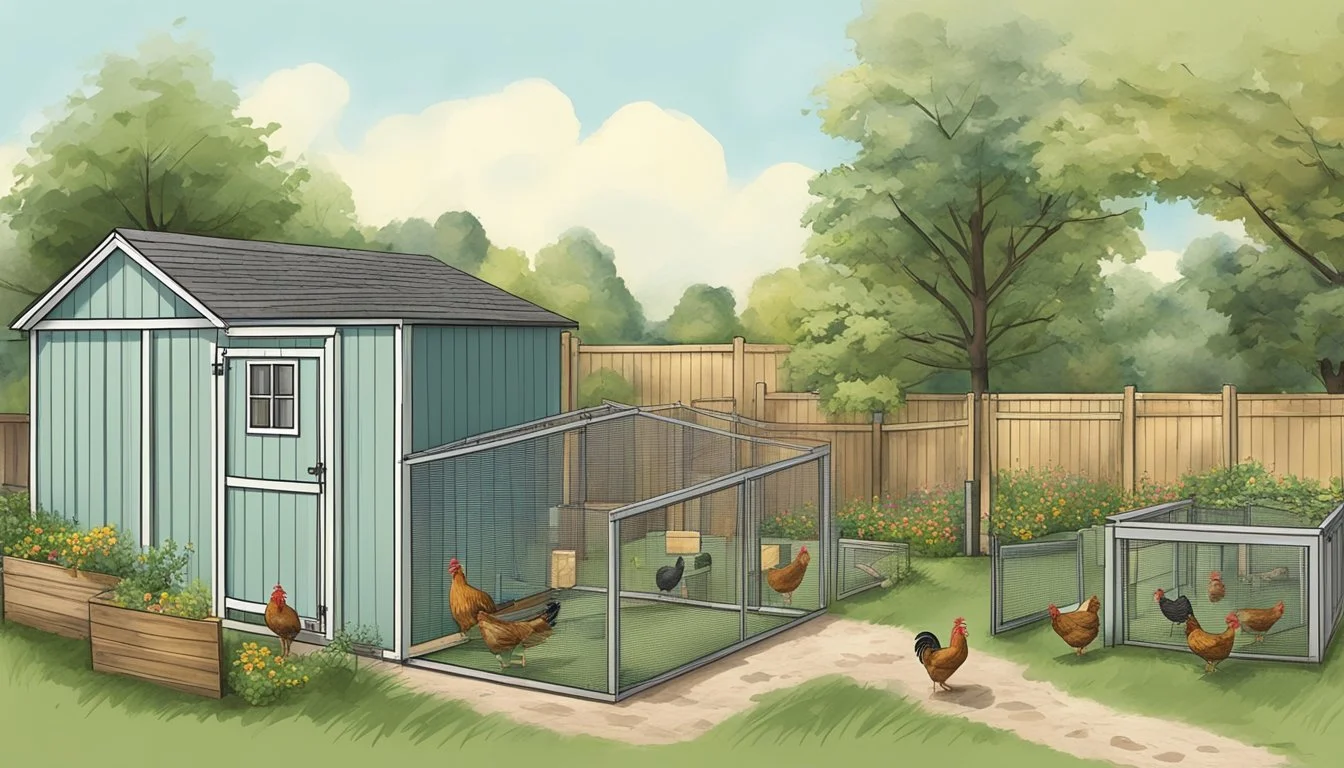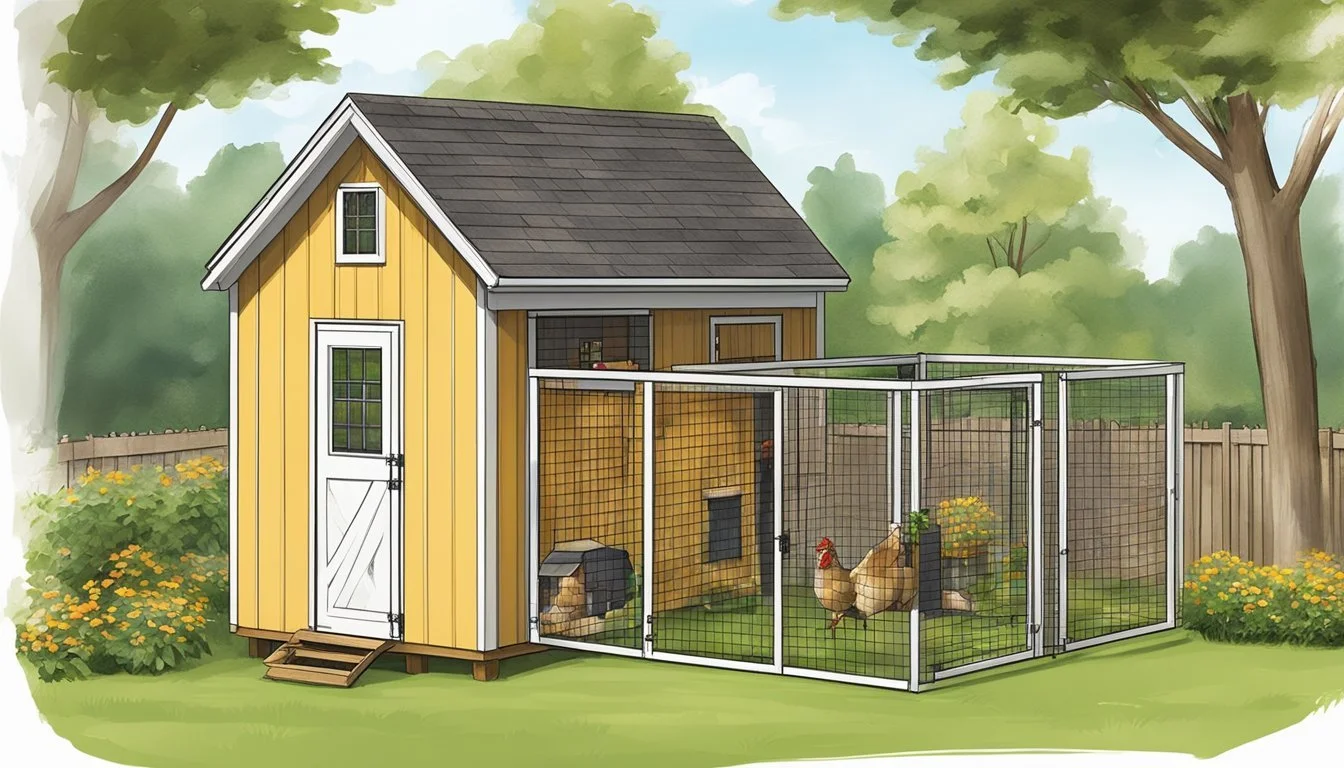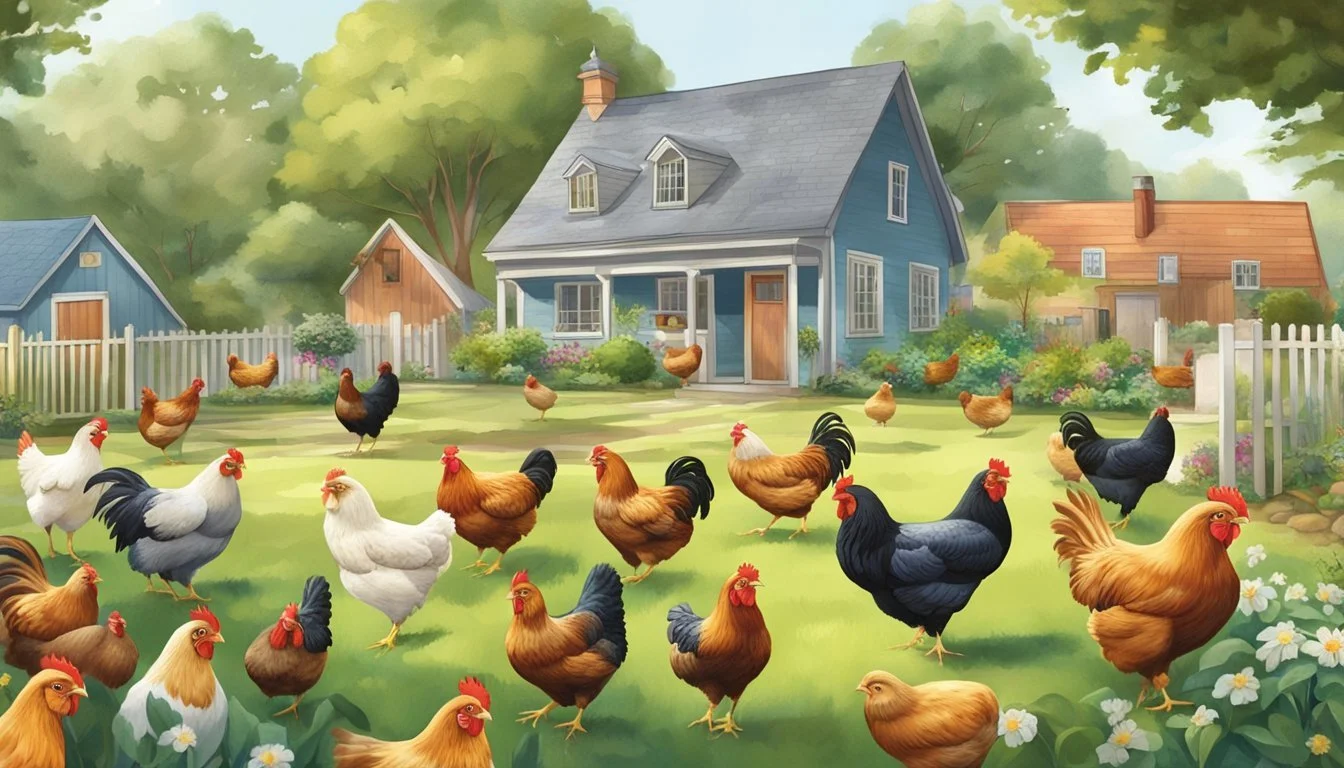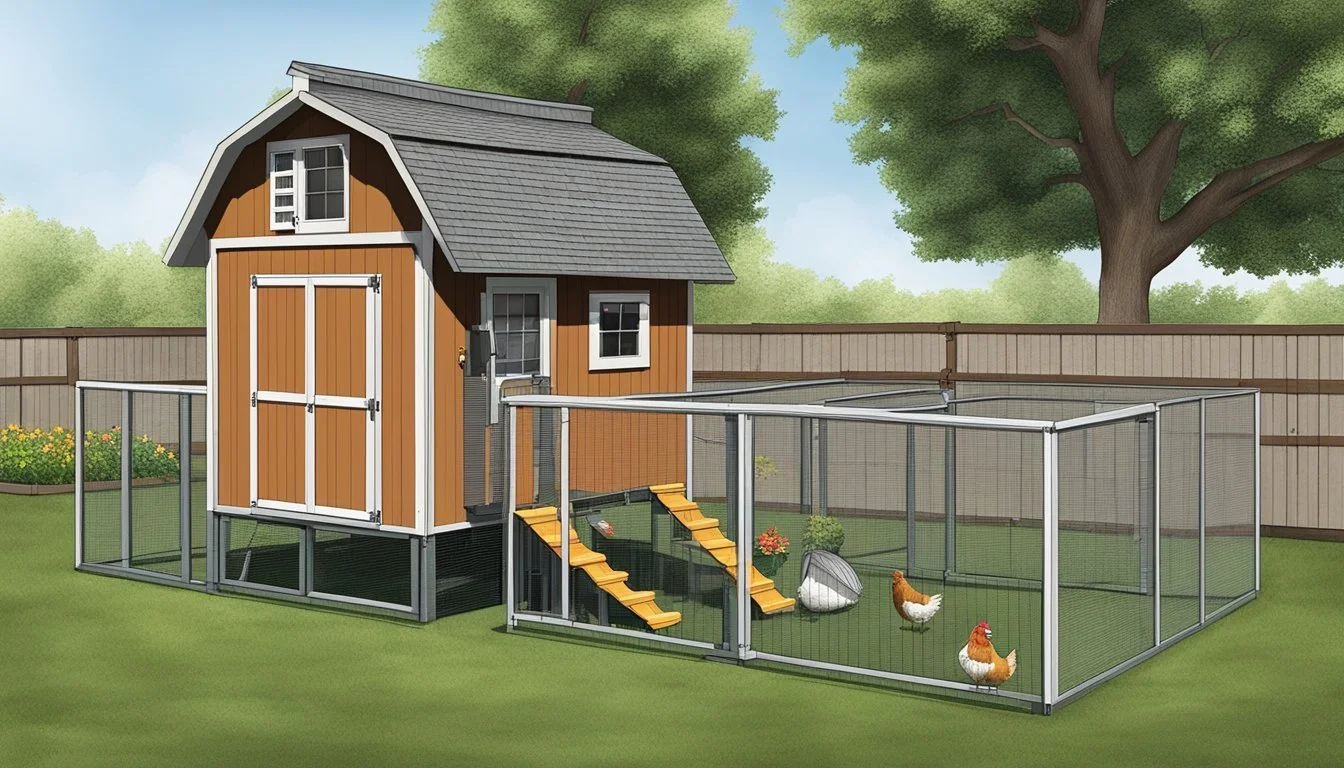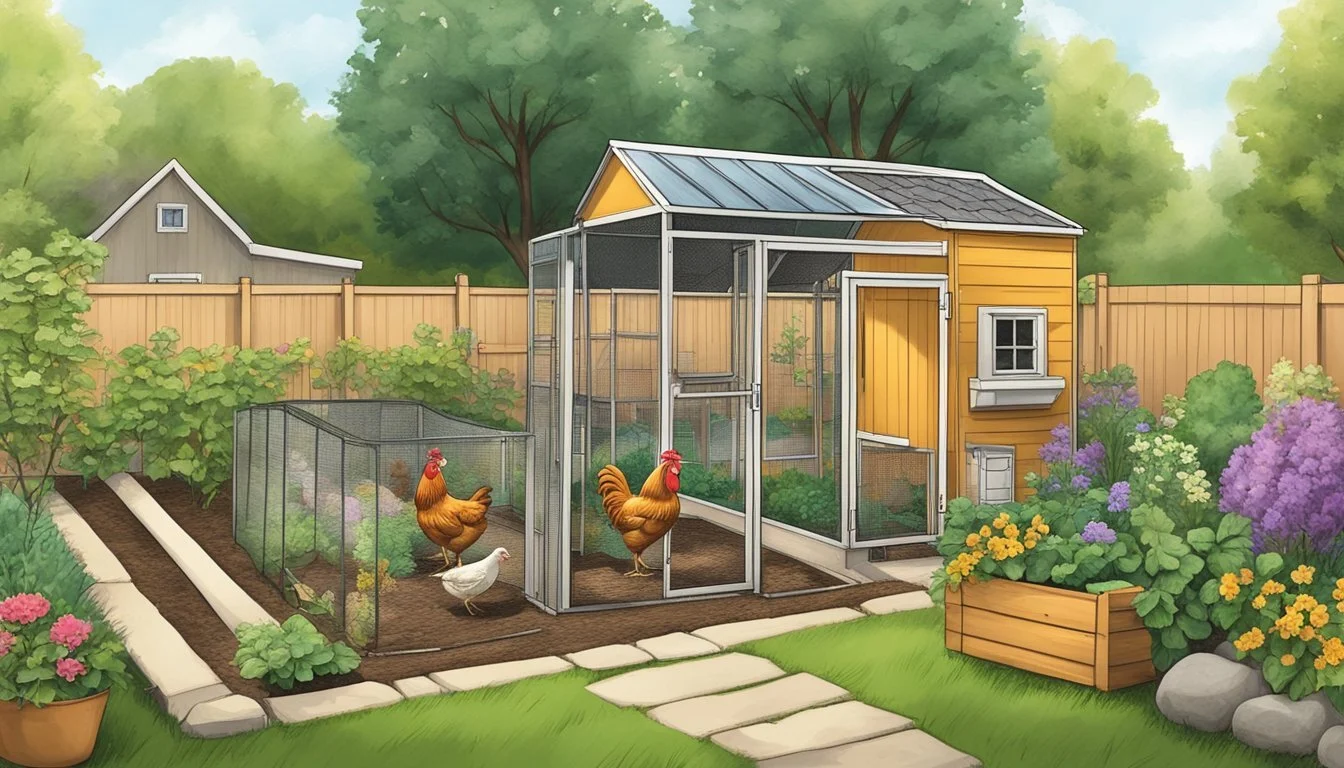Keeping Backyard Chickens in Rochester, MN
Essential Guidelines and Tips
The practice of keeping backyard chickens in Rochester, MN, has gained popularity as residents seek a more sustainable and personal approach to sourcing eggs. The City of Rochester accommodates this trend through specific ordinances geared towards maintaining public health and safety while allowing individuals to raise chickens in their backyards. Interested residents must abide by city regulations, including the acquisition of a permit which is subject to annual inspections by Animal Control Officers. This ensures that both chickens and citizens coexist harmoniously.
Rochester's regulations on backyard chickens provide a framework for urban poultry farming that reconciles the community's interest in local food sources with city standards. Homeowners looking to keep a flock are required to follow ordinances that detail the definitions, confinement, coops, and conditions to promote well-maintained, healthy living environments for the chickens. The city offers different levels of permits depending on the number of chickens a resident intends to keep, with a clear stipulation of the maximum numbers allowed under each permit tier.
Local businesses have also sprung up to support this agricultural endeavor, catering to those who may not wish to commit fully to chicken ownership. Companies in Rochester offer rental services, providing all-inclusive backyard chicken packages. These services have made it simpler for families to experience the benefits of fresh eggs without the long-term responsibilities that come with raising poultry. These developments underscore Rochester’s commitment to integrating sustainable practices into the fabric of urban life.
Understanding Local Ordinances
In Rochester, Minnesota, keeping backyard chickens is regulated by specific ordinances, and residents must adhere to permit procedures. Comparative nuances exist between Rochester and other cities within the state, and penalties may apply for non-compliance.
Navigating Rochester's Chicken Ordinance
The City of Rochester enforces an ordinance that allows residents to keep chickens under certain conditions. Specifically, one must obtain a permit before harboring chickens. Up to three hens are permitted per premise. Rochester operates under the Minnesota chicken laws, maintaining its own set of rules for urban poultry.
Permit Procedures and Regulations
Applicants in Rochester seeking to keep chickens must contact the city clerk to acquire a permit. To comply with the permit requirements:
A detailed application must be submitted.
The property is subjected to inspections.
Neighbors may be notified to gauge public acceptance.
Specific coop standards, such as construction and placement, are enforced.
Comparison with Other Minnesota Cities
While Rochester allows up to three hens with a permit, other cities in Minnesota have their own regulations. For example, Minneapolis and Duluth also allow urban chickens with varying stipulations on the number and type of fowl. Cities such as Bloomington, Lakeville, Blaine, and Eagan each have their unique chicken laws that reflect distinct community standards and concerns.
Penalties for Non-Compliance
Residents who fail to comply with the chicken ordinance in Rochester may face penalties. Enforcement actions can include:
Fines for violating the terms of the permit.
Revocation of the permit to keep chickens.
Mandatory removal of chickens from the property.
Residents must ensure they are fully informed and compliant with local ordinances to avoid such consequences.
Setting Up Your Chicken Coop
Setting up a chicken coop on a residential property in Rochester, MN, involves careful planning to ensure the safety of the chickens and compliance with city regulations. Attention to location, design, sanitation, and protection is essential for a successful backyard chicken habitat.
Choosing the Right Location
For a chicken coop in Rochester, selecting a spot that’s elevated and well-drained reduces the risk of flooding and disease. The area should provide natural light and ventilation but also shade to protect hens from excessive sun. It's important to place the coop away from property lines to adhere to city zoning laws.
Coop Design and Requirements
A well-designed coop must have:
Minimum Space: At least 4 square feet per bird inside the coop.
Ventilation: Proper airflow to dissipate moisture and odors.
Insulation: To safeguard chickens against Minnesota's harsh winters.
Nest Boxes: One box for every 3-4 hens.
In Rochester, the coop must be structurally sound to prevent escape or entry by predators and comply with local building codes.
Maintaining Sanitation and Odor Control
Regular maintenance of a chicken coop is vital for cleanliness and odor control. This involves:
Daily: Removing and replacing soiled bedding.
Weekly: Scrubbing feeders and waterers.
Monthly: Comprehensive coop cleaning to prevent disease.
Proper waste disposal systems must be in place to contain and eliminate odors.
Protecting Against Predators and Weather
Protection features include:
Sturdy Fencing: To keep predators out.
Lockable Doors: Secure the coop at night.
Roof Overhangs: Prevent snow and rain from entering the coop.
The coop should withstand local weather conditions, such as Rochester's chilly winters, and deter predators common to the area.
Daily Management and Care
Managing backyard chickens requires consistent daily care. Owners in Rochester, MN should prioritize proper feeding, health monitoring, egg handling, and socialization to ensure their chickens thrive.
Feeding and Nutrition
Chickens need a balanced diet to maintain their health and egg production. Owners should provide:
A commercially available layer feed containing essential nutrients.
Access to clean, fresh water at all times.
Optional grit if chickens do not have access to coarse soil.
Health Monitoring and Disease Prevention
Observing chickens daily allows owners to recognize usual behaviors and identify signs of distress or illness. Key practices include:
Watching for symptoms: such as lethargy, respiratory issues, or changes in eating habits.
Maintaining clean coops: to prevent the spread of disease.
Implementing vaccination programs: and other preventative measures when necessary.
Egg Collection and Handling
Eggs should be collected regularly to ensure freshness and prevent breakage. Owners must:
Gather eggs at least once a day.
Store eggs in a cool, temperature-controlled environment.
Clean eggs with care to maintain the natural protective coating.
Interaction and Socialization
Chickens benefit from regular interaction, which can help them acclimate to humans and other pets. It's important to:
Spend time daily with the flock to build trust.
Introduce other pets or children gradually and under supervision.
Provide a safe and enriching environment for chickens to explore.
Legal Aspects of Raising Chickens
When deciding to raise backyard chickens in Rochester, MN, it's pertinent that residents are not only aware of but also comply with the city's specific chicken ordinances which cover a range of legal requirements from zoning to neighbor consent and business practices related to poultry.
Understanding Zoning Laws
Rochester's city ordinance stipulates clear zoning laws for keeping chickens. Prospective chicken owners are required to obtain a permit, ensuring that their chicken coops adhere to set confinement standards. It is important to note that the keeping of chickens is limited to certain areas, hence residents must verify their property's zoning designation before applying for a permit.
Liability and Neighbor Considerations
Before setting up a chicken coop, residents must consider their neighbors. The ordinance necessitates obtaining written consent from 80 percent of neighbors within 100 feet of one's property. This requirement is imposed to mitigate potential nuisances such as noise or odor. Additionally, the city strictly prohibits the keeping of roosters or male fowl over four months of age, to control noise levels.
Selling Eggs and Home Poultry Businesses
For those interested in selling eggs or operating a small-scale poultry business from home, Rochester's city ordinance must be adhered to. Rules define a maximum number of 30 fowl that can be kept in a space, enabling residents to raise chickens for meat or egg production on a small scale. However, any commercial activity will likely require additional business licensing and adherence to health regulations to ensure public safety.
Community and Educational Benefits
Backyard chicken keeping in Rochester, MN not only enriches the local food supply but also provides a platform for community engagement and education. This section explores the multifaceted educational and communal advantages of urban poultry farming.
Engaging with Local Chicken Enthusiasts
Local businesses, such as Our Backyard Chicken LLC, foster a sense of community by allowing residents to rent chicken coops and chickens. This initiative connects individuals with similar interests, enabling them to share experiences, tips, and support for raising backyard poultry. Such interactions often lead to community-building activities that benefit both individuals and Rochester as a whole.
Educational Opportunities for Children
Children in Rochester have the unique opportunity to learn about the responsibilities of caring for animals and understanding where their food comes from. Educational programs on backyard chicken keeping expose young minds to the cycles of life and food production, contributing significantly to their growth and development.
Contribution to Local Food Systems
Backyard chickens are a step towards self-sufficiency and bolstering the local food system in Rochester. Residents who keep chickens contribute to the local food supply by producing eggs and, sometimes, meat. This practice not only ensures fresher produce but also reduces the carbon footprint associated with long-distance food transport.
Promoting Sustainable Practices
The trend of keeping backyard chickens aligns with sustainable living practices. It promotes environment-friendly habits such as recycling food scraps as chicken feed and utilizing chicken waste as compost for gardens. This ecological cycle supports a greener Rochester and encourages residents to adopt more sustainable lifestyles.
Health and Safety Considerations
The care of backyard chickens in Rochester, MN requires diligence in preventing disease and ensuring both human and poultry health. Proper hygiene, disease management, and waste handling are crucial to maintain a safe environment.
Identifying and Preventing Salmonella
Salmonella is a significant risk associated with backyard poultry. Preventative measures include regular hand washing with soap and water after handling chickens or equipment. Young children under 5 years should not handle or touch the poultry since they are more susceptible to infection. Monitoring the flock for symptoms of illness and seeking treatment promptly can prevent the spread of this disease.
Safe Handling of Chickens and Equipment
Chickens and their care equipment should be handled with care to avoid contamination. Hands must be washed thoroughly with soap and water after contact. Equipment should be cleaned and sanitized regularly to prevent odors and potential disease spread. Additionally, it's important to avoid eating or drinking around the birds to prevent the transfer of pathogens to the mouth.
Communicable Diseases and Public Health
Backyard poultry can be carriers of diseases such as avian influenza. To protect public health, owners should be knowledgeable about such communicable diseases and their prevention. This includes implementing biosecurity measures like restricting access to poultry areas to minimize the risk of disease spread.
Water and Waste Management
Appropriate water and waste management are vital to prevent odor and the spread of disease. Water sources should be clean and refreshed regularly. Proper disposal of poultry waste must be practiced, with regular coop cleaning to maintain sanitation and health. This not only promotes the well-being of chickens but also prevents the attraction of pests and predators.
Additional Types of Backyard Poultry
While chickens are a popular choice for backyard poultry in Rochester, MN, residents may also consider other birds such as ducks and pigeons. These species come with their own specific needs and local regulations.
Raising Ducks and Capabilities
Ducks can be a rewarding addition to backyard poultry, known for their ability to lay eggs and for pest control. They generally require more water than chickens, not just for drinking, but also for bathing and maintaining their hygiene. Their housing should be spacious and secure with access to a water source such as a kiddie pool or a small pond.
Water Requirements for Ducks:
Drinking: Fresh water daily
Bathing: Access to clean water for bathing, helps in maintaining feather health
Ducks are also foragers by nature, often consuming more pests than chickens, which makes them excellent at keeping the local bug population under control.
Keeping Pigeons and Regulations
Pigeons have been kept for their homing capabilities, for ornamental purposes, and even for meat. When deciding to keep pigeons, one must take into account that they require lofting spaces that are clean, dry, and secure from predators.
Pigeon Loft Essentials:
Cleanliness: Regular cleaning is essential to prevent disease.
Ventilation: Good airflow without direct drafts.
Space: Adequate space for flying and roosting.
Regulations in Rochester, MN, may vary, and it is important to check with local ordinances regarding the keeping of pigeons, as permits and specific cooping requirements might apply, akin to those for chickens.

